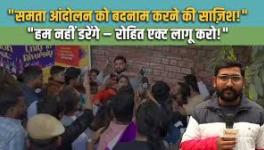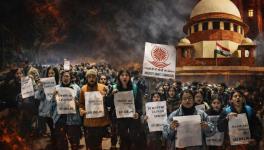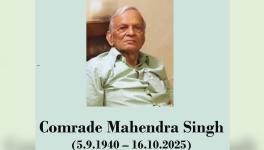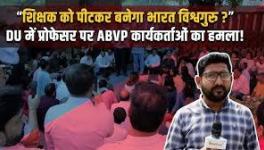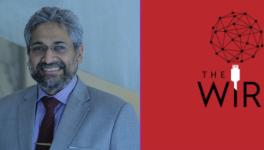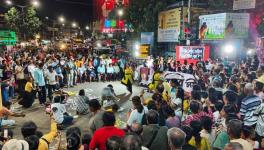A Delhi University Student-Activist Explains why DUSU Election Matters
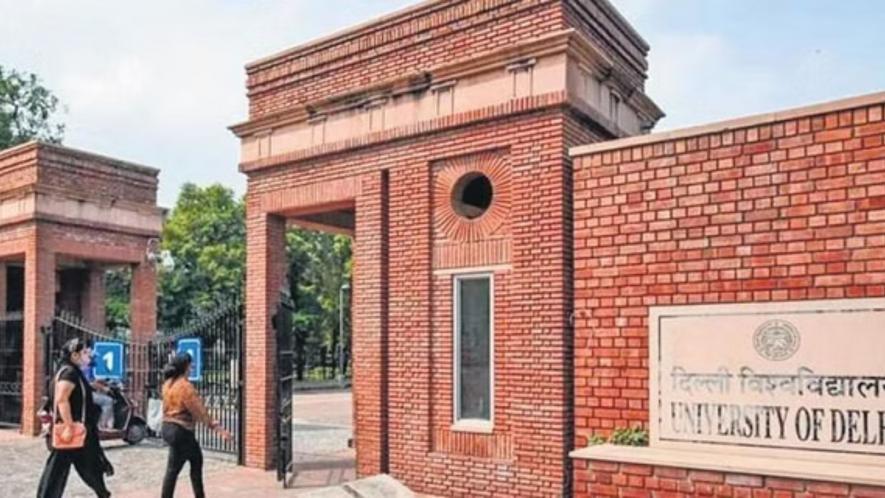
Image Courtesy: PTI
The coveted Delhi University Students Union (DUSU) election is around the corner and set to be held on 22 September after a long three-year gap. With an electorate of almost three lakh students, the DUSU election is among the most elaborate student elections held in the country.
Sadly, in the past, an event that should have celebrated participatory democracy was primarily reduced to a show of brute force and monetary strength. The Akhil Bharatiya Vidyarthi Parishad (ABVP), which has held the reins of DUSU for more than a decade, has been chiefly associated with rampant electoral malpractices and an inactive union.
This time, the student community of Delhi University has a unique chance to break the cycle of violence and intimidation and set the precedent for a healthy political culture. Electing Left-progressive students to the central panels would be a step towards saving the public university from further ruinage.
The DUSU election has become infamous for the obnoxious show of wealth and muscle power by ABVP candidates. In serious violation of the Lyngdoh Committee guidelines, ABVP candidates are currently seen campaigning with long convoys of expensive cars. A friend jokingly said the DUSU president’s convoy supersedes the convoy of the President of India in grandeur!
The ABVP members have installed massive printed billboards with names wilfully distorted—such as by adding extra letters. The motive is to mask the identities of those violating the guidelines to avoid any financial scrutiny of their illegal expenses. A cursory look at the Delhi University campus in the days leading up to the election would reveal roads covered with small printed pamphlets from end to end.
Candidates have also been seen distributing attractive presents to students to woo them into supporting them. The complicated political economy of the DUSU election somewhat explains such extravagance. Instead of treating it as an opportunity to represent the voice of the student community, DUSU candidates look at the election as a springboard for their future political careers.
In addition, elite caste loyalties have traditionally played a significant role in deciding the fate of the candidates. In a society polarised along caste lines, monetary spending by candidates is taken to be proportional to their caste power and privilege. Their political and financial backers are either traditional landed elites or businessmen, all from upper-caste backgrounds.
The massive scale at which such candidates invest their resources during the election makes it safe to speculate that they back certain candidates in exchange for help brokering lucrative deals with the university authorities. The DUSU election has, thus, been turned into a theatre of extraneous interests playing out in broad daylight.
If these candidates cannot sway the students in their favour, they resort to violent intimidation tactics. They usually maintain groups of strongmen armed with lathis and hockey sticks, ready to ambush opposition candidates and supporters.
In 2019, there were several incidents of violence targeting activists of left and progressive organisations.
Inflicting bodily harm and injury has often been the primary technique to prevent opposition candidates from campaigning. Over the years, ABVP’s musclemen have forcibly tried to restrict opposition candidates from filing nominations and preventing them from putting up posters around the campus.
In the last few weeks of August, ABVP campaigners illegally broke down the gates of women’s colleges like Aditi Mahavidyalaya and Miranda House. Several women had earlier raised concerns regarding their safety within their own campuses. However, without regard to public opinion, the ABVP has repeatedly tried to gain entry into women’s colleges, violating election protocols.
Such desperation reflects a spent force trying to claw onto the little available means to keep itself floating. The politics of muscle power and intimidation is an evil chasing the students of Delhi University for very long, making campuses unsafe for them.
The performance of the ABVP-led DUSU in the tumultuous years since 2019 has been nothing more than a disappointment. The union oversaw the drastic fragmentation of the student body as a result of the COVID-19 pandemic. Colleges and departments were shut down overnight. Zoom meetings and Google Meets became the only interface between students and teachers. In a country where less than 40% of the students in the higher education ecosystem have access to proper Internet connectivity, the online mode proved a massive disaster.
Virtual drop-out rates skyrocketed, and students missed out on the valuable classroom experience that the university offered, while libraries and reading rooms remained out of bounds. Amidst a crisis of such magnitude, the university administration made no efforts to make digital resources accessible to students. Due to the lack of hostels at Delhi University, many students could not find affordable shelters in the city. Government grants and scholarships dried up, leaving many students no means to continue their education.
Aishwarya, a sophomore Mathematics Honours student from Lady Shri Ram College for Women, was forced to take her own life due to a lack of funds to continue her education. In such trying times, the student body expected their elected union to demand cheaper internet packs, easier access to digital resources, and special fellowships for marginalised students to fund their education. The union could have conducted detailed surveys to understand students’ problems and taken measures to prevent drop-outs. However, no noticeable action in that direction was seen from the union.
The Union government arm-twisted the Parliament into passing the New Education Policy in 2020 without any discussion. In lieu of the new legislation, Delhi University was the first institution in the country to implement the four-year undergraduate programme (FYUP).
The FYUP was already a failed experiment, rejected in 2013 by an overwhelming majority of students of the University. Its reinstitution, along with the dubious multiple entry-exit scheme, is believed to endanger the future of thousands of students from underprivileged backgrounds.
Most students in a low-income economy like India would be unable to pull up funds for an extra year of study. The significant reduction of credits in the core subjects and the introduction of a number of “hobby courses” termed Value Added Courses (VACs) would render both honours and programme degrees useless.
Most of these courses add very little to the training of students in their specific disciplines. Moreover, most colleges lack the requisite infrastructure and human resources—classrooms and teachers—to offer these VACs. The system allows for the conduction of Continuous Internal Assessment and grants the teacher undue authority in determining student evaluation. The research component facilitated in the fourth year of the honours programmes is also a farce, given the dismal state of institutional support systems in the colleges.
A closer look at this ill-equipped mimicry of the deeply flawed American education system reveals its not-so-apparent sinister motives of gradually shutting the doors of the colleges for the poor students of our country and creating a docile and obedient student community.
Discontent against FYUP is on the rise among students. The two largest left student organisations on the campus have mobilised an impressive number of students on the issue. The Students’ Federation of India (SFI) conducted a referendum on FYUP at the Arts Faculty of Delhi University on 1 September, and 85% of the participants voted against the discriminatory policy.
On 5 September, the All India Students’ Association (AISA) organised a rally titled “FYUP Pe Halla Bol” on the North Campus, which saw significant participation. Other left and progressive organisations have constantly protested against the anti-student policies mandated by the NEP. Unfortunately, however, the union led by ABVP functioned like an extended branch of the Delhi University administration, aiding the implementation of the NEP.
The union also failed to take a tough stance against the university’s efforts to increase the fees of several professional programmes, like that of law. Time and again, they have proved their allegiances to the interests of big capital by supporting the path of privatisation that Delhi University is currently trying to undertake.
The FYUP is only one of many problems plaguing Delhi University’s student community. Allegations of large-scale corruption and undue favouritism in the permanent recruitment of college teachers have been racking the students since December last year. Instead of absorbing the experienced ad hoc teachers serving in colleges for years, teachers with questionable competence and links with the ruling dispensation were given permanent employment.
Samarveer Singh, a 33-year-old professor of philosophy who taught at the prestigious Hindu College for more than six years, was rendered unemployed after years of service. He was eventually compelled to commit suicide on 26 April. The karamcharis, or workers from various colleges, have been on strike since the beginning of the year, demanding absorption and fair recruitment.
Irregularities surrounding postgraduate admissions have also evoked a major outcry among students. The university has released no merit list based on the CUET-PG scores. While students compared their scores with their peers, it was found that even within the same categories, many students who had superior scores were denied seats, whereas ones with lower scores were admitted. The students had expected the union to stand up against such blatant compromise of pedagogical standards by the university. It mostly remained silent, while the left progressive organisations were out on the streets demanding more transparency and accountability from the administration.
Every DUSU election has presented an opportunity for the student body to assert its collective voice. However, this year’s election has no semblance with elections from the past. For the first time in the University’s history, about 90% of the electorate—students from the current first, second, and third years of under-graduation and first year of post-graduation—has yet to witness a DUSU election.
A fresh palette offers new colour combinations to flourish. The students, in lieu of a blank slate, are presented with a vital opportunity. They have the potential to shape their desired student politics—to eradicate the politics of violence, communal hatred, caste loyalty, and money power from the campus. By electing representatives of left and progressive forces, the students can ensure the formation of a more proactive DUSU: one that would not be a mere subsidiary of the administration and can represent the demands of the students effectively.
This is a crucial juncture ahead of the 2024 General Election that calls for more concerted efforts from students to forge solidarities against the ills of privatisation and communalisation of the public-funded higher education system. I earnestly hope that the students of Delhi University can constitute a union suitable to their core interests on 22 September.
The author is an activist and a Master’s student of history at the University of Delhi. The views are personal.
Get the latest reports & analysis with people's perspective on Protests, movements & deep analytical videos, discussions of the current affairs in your Telegram app. Subscribe to NewsClick's Telegram channel & get Real-Time updates on stories, as they get published on our website.









